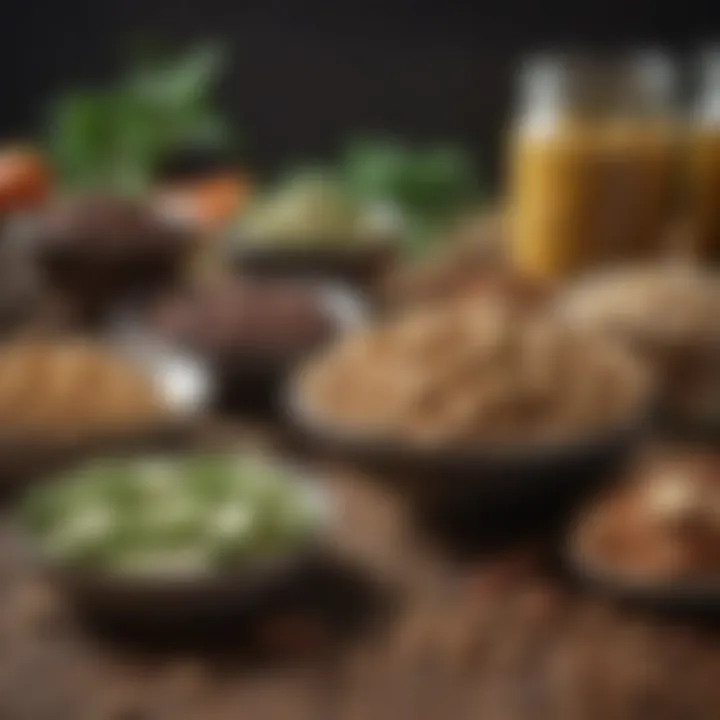Essential Vegan Meal Plan for Bodybuilders


Intro
Pursuing bodybuilding as a vegan presents a mix of challenges and opportunities. Ensuring adequate nutrition is critical for performance and recovery. This article seeks to elaborate on how to navigate these complexities. Vegan diets can offer sufficient macronutrients and micronutrients when planned properly.
Building muscle without animal products requires understanding the right combination of foods. Legumes, grains, nuts, and seeds can be excellent sources of protein. Also, being aware of potential deficiencies in vitamins such as B12 and minerals like iron is essential. A well-structured meal plan addresses these needs effectively.
Targeting a specific audience like health professionals, wellness coaches, and nutritionists will allow for a more in-depth discussion. The goal is to present a detailed path to peak physical condition while adhering to ethical dietary choices.
In the sections that follow, we will explore vital nutritional components and practical strategies for creating an effective vegan meal plan designed for bodybuilders.
Key Takeaways
- A well-rounded vegan diet can support muscle building with proper planning.
- Combining various plant sources can lead to complete protein intake.
- Being mindful of micronutrient levels is crucial in a vegan bodybuilding regimen.
"A vegan diet can be sustainable, nutritionally rich, and beneficial for bodybuilders when executed thoughtfully."
Practical Tips
- Incorporate diverse protein sources such as lentils, quinoa, and chickpeas in daily meals.
- Stay consistent with nutrient intake. Tracking food can help ensure adequate calories and macros.
- Consult with a nutrition specialist if unsure about specific dietary needs.
By leveraging high-quality ingredients and scalable strategies, building a comprehensive meal plan tailored for vegan bodybuilders will become more attainable. The following sections will delve into each aspect in greater detail.
Understanding the Nutritional Needs of Vegan Bodybuilders
The journey of a vegan bodybuilder requires a profound understanding of the nutritional framework that supports muscle development and recovery. Unlike traditional bodybuilders, who can rely on animal products for protein and other nutrients, vegans must approach their diet with careful consideration. The dietary choices made must adequately fulfill the protein, carbohydrate, and fat needs essential for performance and optimizing muscle growth.
In this section, we focus on key nutritional components that vegan bodybuilders should prioritize, emphasizing the need to construct a well-rounded diet that meets all macro and micronutrient requirements.
Significance of Macronutrients
The macronutrient composition of a diet plays a critical role in achieving bodybuilding goals. For vegan bodybuilders, sourcing these nutrients from plant-based products requires attention to specific ratios that promote muscle growth and overall health.
Protein requirements
Protein is vital for muscle repair and growth. The recommended intake for bodybuilders is often higher than the average person, around 1.6 to 2.2 grams per kilogram of body weight. Plant-based proteins, while sometimes lacking in one or more essential amino acids, can be effectively combined to create a complete protein profile. Foods like lentils, chickpeas, and quinoa can be included in meals to help meet these protein needs. The key characteristic of this requirement is its direct contribution to muscle recovery, which is crucial after intensive workouts.
Carbohydrate ratios
Carbohydrates function as the primary energy source, especially during weight training. A higher carbohydrate ratio can support energy levels and aid in recovery. Typically, about 50-60% of total caloric intake should come from carbohydrates. Whole grains, fruits, and starchy vegetables are excellent sources. These food items do not only provide energy but also come with fiber, promoting gut health. However, attention must be paid to the glycemic index of carbohydrates consumed to ensure sustained energy levels without spikes and crashes.
Fats and their role
Healthy fats are essential as they assist in hormone production and nutrient absorption. Including about 20-35% of daily calories from fats is beneficial, focusing on sources like avocados, nuts, and seeds. These fats are crucial for overall well-being and, in moderation, support performance by providing a dense source of calories. The unique feature here is that fats deliver a concentrated energy source when carbohydrate availability is low, but they must be balanced to prevent unwanted weight gain.
Micronutrients of Concern
Micronutrient adequacy is particularly important for vegan bodybuilders, as certain vitamins and minerals may be underrepresented in plant-based foods. Being aware of these deficiencies and their implications on health and performance is critical in dietary planning.
Vitamins and minerals
Vitamins and minerals such as B12, iron, calcium, and omega-3 fatty acids can be more challenging to obtain from a vegan diet. B12, crucial for energy production and neurological function, is predominantly found in animal products and must be supplemented. Iron from plant sources is not as readily absorbed by the body, making vitamin C-rich foods a necessary addition to enhance absorption. A thorough understanding of these nutrients is key to ensuring optimal performance and preventing deficiencies that could hinder results.
Supplements for vegans
Given the challenges in meeting nutritional needs through diet alone, supplements can play a critical role. Protein powders made from peas, brown rice, or hemp can help in achieving daily intake levels for protein. Additionally, vitamin D3 and B12 supplements are widely recommended. The appeal of supplements lies in their convenience; however, they should not replace a nutrient-dense diet. Taking too many supplements may also lead to imbalances, so moderation is essential.
Sources of antioxidants
In vegan bodybuilding, antioxidants are beneficial for combating oxidative stress caused by intense training. Foods like berries, nuts, and dark leafy greens are rich in antioxidants, supporting recovery and reducing inflammation. The unique aspect of incorporating these foods lies in their dual benefits: providing essential nutrients while protecting against cellular damage. This balance aids in faster recovery times, allowing for a more consistent training regimen.
Hydration and Recovery
Proper hydration is often overlooked yet plays a vital role in performance. Bodybuilders are at risk of dehydration due to heavy sweating during workouts, which can impact strength and recovery.
Importance of water intake
Water is essential for nearly every bodily function, including nutrient transport and temperature regulation. A general guideline suggests consuming at least 3 to 4 liters of water daily for active individuals, adjusting based on activity levels and environmental conditions. Staying well-hydrated supports endurance and reduces the risk of cramps and fatigue during workouts. The critical feature is developing a hydration strategy that incorporates fluids before, during, and after workouts.
Recovery drinks for bodybuilders
Post-workout recovery drinks can be beneficial in replenishing lost nutrients. Many bodybuilders opt for drinks high in carbohydrates and protein immediately after training. This combination helps restore glycogen stores and supports muscle recovery. While store-bought recovery drinks exist, many find homemade versions using fruits, nut milks, and protein powders to be effective and healthier. The advantage is the ability to control the ingredients and tailor it to individual needs.
Electrolytes and performance
Electrolytes, including sodium, potassium, and magnesium, are crucial for maintaining fluid balance and muscle function. Replenishing these during intense training or prolonged workouts is vital to avoid muscle cramps and fatigue. Foods such as bananas, coconut water, and even electrolyte powders can help restore these essential minerals. There is a fine line between supplementation and achieving electrolyte balance through diet, requiring careful consideration of individual needs and workout intensity.
Crafting a Balanced Vegan Meal Plan
Crafting a balanced vegan meal plan is essential for individuals devoted to bodybuilding. A well-structured meal plan can significantly enhance performance, recovery, and overall wellbeing. For vegan bodybuilders, the focus must be on ensuring that all nutritional needs are met, despite the absence of animal products. This section delves into various aspects that are crucial for building a comprehensive meal plan.
Meal Frequency and Timing
Optimal meal frequency


Optimal meal frequency is about how often meals should be consumed to maximize nutrition and support muscle growth. Many bodybuilders find that eating smaller, more frequent meals helps to provide a steady supply of nutrients. This approach can prevent hunger pangs and can aid in digestion. It usually involves consuming meals five to six times per day.
One of the key characteristics of optimal meal frequency is that it can help prevent energy crashes and keep metabolism stable. For vegan bodybuilders, this strategy can promote better nutrient absorption and ensure that protein requirements are consistently met.
A disadvantage might be that frequent meals can require more planning and preparation. It may not be practical for all individuals due to varied schedules.
Pre- and post-workout nutrition
Pre- and post-workout nutrition are central to optimizing training performance and recovery. Consuming the right foods before and after a workout can enhance energy levels and muscle repair. A key element is to include carbohydrates for energy as well as protein for recovery. This balance is crucial for anyone, especially vegan bodybuilders who may have limited options.
The unique feature of this nutrition strategy is its focus on timing. Pre-workout meals should be consumed about one to three hours prior to exercise, and post-workout meals should be ingested within 30 minutes to two hours after training. This synchronization can maximize muscle glycogen replenishment and protein synthesis.
However, a downside could be the need for careful planning to fit these meals into tight schedules, which could be challenging for active individuals.
Snacking strategies
Snacking strategies can play a pivotal role in sustaining energy levels throughout the day. Healthy snacks are a convenient way for vegan bodybuilders to meet their caloric and nutritional needs without having to prepare full meals. The emphasis should be on nutrient-dense snack options that provide a mix of carbohydrates, proteins, and healthy fats.
One key feature of effective snacking is variety. Incorporating different snacks like energy bars, mixed nuts, or homemade protein balls can keep the diet interesting. This variety can enhance nutrient intake and can help prevent fatigue.
To balance this, it is important to avoid overly processed snacks, as they may not provide the necessary nutrients. Snacking can also contribute to caloric overload if not monitored, so being mindful of portions is essential.
Sample Daily Meal Structure
Breakfast options
Breakfast options are often considered a critical part of the daily food intake, especially for those involved in bodybuilding. Starting the day with a nutritious breakfast can set the tone for sustained energy and focus throughout morning workouts. A balanced breakfast should include a mix of complex carbohydrates and protein.
An example might be oatmeal topped with fruits and a scoop of almond butter. This combination not only fuels the body but also provides essential vitamins and minerals.
A key characteristic of effective breakfast options is their ability to kickstart metabolism. However, some individuals may skip breakfast due to morning routines, which can be detrimental to energy levels later in the day.
Lunch ideas
Lunch ideas can significantly vary but should maintain a balanced approach. A nutrient-rich lunch can supply the body with the necessary fuel for afternoon activities or workouts. Common options include chickpea salads, lentil bowls, or quinoa and vegetable stir-fries.
The unique advantage of a solid lunch is its role in maintaining energy levels. This meal can also be tailored to specific dietary needs, ensuring that macronutrients are on target.
One disadvantage is that, depending on individual schedules, lunch may often be consumed on the go. This can lead to choices that do not align with the nutritional goals.
Dinner recommendations
Dinner recommendations serve as an important end-of-day meal that helps repair and rejuvenate the body after a long day. Dinner should ideally be protein-rich while incorporating plenty of vegetables for fiber and nutrients. Examples include tofu stir-fries or black bean tacos with lots of greens.
The key characteristic of a proper dinner is its ability to promote effective recovery overnight. This meal can also be an opportunity to experiment with flavor and cuisine.
A potential downside is that heavy meals close to bedtime might disrupt sleep, so balancing portion sizes and meal timing is crucial.
Snacks and desserts
Snacks and desserts provide not only a way to satisfy cravings but also contribute to overall nutrient intake. Healthy desserts made from bananas, avocados, or nut butters can serve as a delicious treat while also offering nutritional benefits.
The uniqueness of incorporating snacks and desserts lies in their ability to provide both joy and nourishment. They can help maintain momentum towards dietary goals when timed appropriately.
However, care must be taken with portion control. Overindulgence in snacks can lead to an imbalance in daily caloric intake, impacting progress towards fitness goals.
A structured vegan meal plan allows bodybuilders to meet their unique nutritional needs while enjoying a variety of flavors and foods.
High-Quality Plant-Based Protein Sources
In developing a meal plan for vegan bodybuilders, the significance of high-quality plant-based protein sources cannot be understated. Protein serves as the fundamental building block for muscle repair and growth, making it essential for anyone engaged in rigorous physical training. Vegan bodybuilders must particularly focus on sourcing adequate protein from various plant sources. This ensures their diet is not only balanced but also provides the specific amino acids necessary for optimal muscle development. High-quality proteins are often characterized by a complete amino acid profile, which is crucial for supporting muscle synthesis.
Legumes and Pulses
Legumes and pulses are among the richest sources of plant-based protein available, and they play a crucial role in a vegan bodybuilder's nutrition plan. They are often very versatile and can be used in numerous recipes.
Beans and lentils
Beans and lentils are powerful protein sources. Lentils, for instance, provide about 18 grams of protein per cooked cup. They are also rich in fiber, which aids digestion and helps in maintaining a feeling of fullness. This makes them a great choice for bodybuilders focused on weight management. Furthermore, these legumes contain a good amount of iron, essential for energy levels during workouts.
However, it's worth noting that while they are high in protein, most beans and lentils lack some essential amino acids. Combining them with grains can create a complete protein profile.
Chickpeas and peas
Chickpeas and peas offer another excellent option for protein intake. Chickpeas, also known as garbanzo beans, contain about 15 grams of protein per cooked cup. They are particularly popular for their versatility in dishes like hummus and salads. Peas, on the other hand, are high in protein and low in calories, making them an ideal choice for bodybuilders looking to maintain or lose weight.
The unique aspect of chickpeas and peas is their high fiber content, beneficial for digestive health. Nevertheless, they, too, can be lower in certain amino acids, which is why pairing with other protein sources is advisable.
Nutritional profiles
Understanding the nutritional profiles of various legume and pulse options is essential for balanced dietary intake. For instance, a mixture of beans, lentils, chickpeas, and peas offers not only protein but also a wealth of vitamins and minerals, including folate and magnesium.
These meals generally provide healthy carbohydrates, boosting energy levels. However, it’s critical for athletes to consider their overall caloric intake, as beans and legumes can be slightly higher in calories compared to other vegetables. A balanced approach ensures sufficient energy for training without unwanted weight gain.
Grains and Cereals


Grains and cereals also contribute significantly to protein intake for vegan bodybuilders. Whole grains generally have a higher protein content than refined grains, making them a smarter choice.
Quinoa and its benefits
Quinoa is emerging as a superfood, providing a complete amino acid profile, making it one of the few plant-based complete proteins. A cooked cup of quinoa has about 8 grams of protein. Besides protein, quinoa is rich in vitamins B, E, and various minerals such as magnesium.
The unique aspect of quinoa is its gluten-free nature, making it ideal for individuals with gluten sensitivities. However, it is essential to remember that quinoa, like most grains, is also relatively higher in calories, so portion control can be crucial for managing body weight.
Oats, barley, and rice
Oats, barley, and rice provide essential nutrients and play a significant role in a bodybuilder's diet. Oats, for example, offer about 6 grams of protein per cooked cup and are an excellent source of carbohydrates and fiber, crucial for energy.
Barley contains protein and is very high in fiber, aiding digestion. Rice, particularly brown rice, is another staple that contributes protein but should be consumed in moderation as part of a well-rounded diet.
Each grain has its pros and cons, such as oats being more filling but potentially causing fluctuations in blood sugar if not balanced with protein.
Protein content comparisons
When comparing the protein content of various grains, choices can vary quite significantly. For example, quinoa generally tops the list as a complete protein grain, while oats and brown rice offer decent, albeit incomplete, proteins on their own.
Using a mix of these grains can help ensure that one is receiving adequate protein while keeping meals interesting and varied. Understanding the unique contributions of each is vital in developing a well-balanced, protein-rich diet for optimal bodybuilding performance.
Nuts and Seeds
Nuts and seeds are yet another valuable source of protein and healthy fats. Including these can enhance the nutritional quality of meals for vegan bodybuilders.
Almonds, walnuts, and peanuts
Almonds, walnuts, and peanuts are beneficial choices for protein sources. Almonds provide roughly 6 grams of protein per ounce and are rich in healthy fats that support heart health. Walnuts offer omega-3 fatty acids critical for inflammation reduction post-workout, while peanuts are also a good source of protein and can be consumed in various forms, from whole to peanut butter.
Each nut possesses unique attributes that contribute to overall health, yet moderation is key due to their calorie density.
Chia, flax, and hemp seeds
Chia, flax, and hemp seeds stand out as exceptional protein sources in the vegan diet. Chia seeds are high in omega-3 fatty acids and offer about 5 grams of protein per ounce. Flaxseeds provide similar benefits, while hemp seeds offer a complete protein profile with about 10 grams of protein per 3 tablespoons.
These seeds can be easily incorporated into smoothies, cereals, or baked goods, boosting nutritional content. However, some of these seeds should be ground or soaked for better nutrient absorption.
How to incorporate them
Incorporating nuts and seeds into a vegan meal plan can be relatively easy. They can be added to salads, oatmeal, or smoothies to enhance protein content. Snacking on these items throughout the day can help meet daily protein needs without large meal sizes. However, one should always consider the portion sizes due to their high calorie content.
Overall, utilizing a diverse array of high-quality plant-based protein sources is essential for vegan bodybuilders to achieve their nutrition goals. Regular monitoring of protein intake, combined with an understanding of various sources, will lead to greater success in muscle gain and recovery.
Incorporating Diverse Food Groups
In the quest for optimal physical performance, vegan bodybuilders must pay close attention to a variety of food groups. This diversity in diet is crucial for several reasons. First, different food groups provide unique nutrients that contribute to overall health and muscle development. Combining various foods ensures a fuller spectrum of essential vitamins, minerals, and other beneficial compounds. This approach not only supports muscle repair and growth but also helps in managing energy levels and recovery times.
A well-rounded meal plan comprises various vegetables, fruits, grains, legumes, and nuts. Each of these food categories fulfills specific nutritional roles. For example, vegetables are dense in nutrients but low in calories, making them ideal for filling the diet while keeping it balanced. Fruits, particularly those high in carbohydrates, offer quick energy sources which are essential for post-workout recovery. Incorporating these food groups in moderation and variety keeps the diet rich and fulfilling.
Vegetables for Bodybuilding
Leafy greens
Leafy greens like spinach, kale, and romaine lettuce play a significant role in bodybuilding. These vegetables are rich in vitamins A, C, K, and several B vitamins. They also provide minerals such as calcium and iron, which are vital for maintaining healthy bones and muscle function. The high fiber content of leafy greens aids digestion, making them a beneficial addition to meals.
One key characteristic of leafy greens is their low calorie density. This allows bodybuilders to increase volume in their meals without excessive caloric intake. However, their potential drawback is that they must be consumed in combination with other protein-rich foods to ensure a balanced intake of macronutrients.
Cruciferous vegetables
Cruciferous vegetables, including broccoli, cauliflower, and Brussels sprouts, offer unique health benefits. They are known for their high content of fiber and antioxidants. These properties contribute to improved digestion and reduced inflammation, which is particularly beneficial for anyone engaged in intense training.
The high amount of fiber in cruciferous vegetables may aid in maintaining a feeling of fullness, helping with appetite control. Yet, some might find that these vegetables can produce gas, which might require some adjustment in amounts consumed. Despite this, they remain an excellent choice due to their nutrient density and health benefits.
Starchier options
Starchier vegetables such as sweet potatoes, corn, and squash serve another essential function in a vegan bodybuilder's diet. These options provide necessary carbohydrates that are crucial for energy, especially before and after workouts. They are also gluten-free, making them suitable for individuals with specific dietary restrictions.
Notably, these vegetables are rich in vitamins and minerals like potassium and beta-carotene, which support overall health. The downside could be the higher caloric count compared to non-starchy options, which necessitates portion control to stay within caloric goals. Nevertheless, their contribution to energy levels makes them a valuable component of a balanced meal plan.
Fruits as Fuel
Fruits high in carbohydrates
Fruits such as bananas, dates, and mangoes are high in carbohydrates and serve as excellent energy sources for bodybuilders. These fruits provide readily available sugars that can quickly replenish glycogen stores after intense workouts. The natural sugars in these fruits are preferable to processed sugars, offering added benefits like vitamins and minerals.
Fruits with high carbohydrate levels can be particularly useful during training; however, it is advisable to consume them in moderation to avoid spikes in blood sugar levels. Proper timing of consumption, especially around workout sessions, can maximize their effectiveness in enhancing performance and recovery.
Role of fruits in recovery
The role of fruits in recovery cannot be understated for vegan bodybuilders. After strenuous workouts, antioxidants found in fruits like berries, cherries, and oranges can help reduce oxidative stress and muscle soreness. These fruits also have hydration benefits, aiding in rehydration after sweating.
Their natural sugars facilitate swift recovery. Incorporating fruits in recovery meals can enhance nutrient absorption when combined with proteins. However, a balanced intake is essential to avoid excess caloric consumption from sugars.
Best fruits for muscle gain


Certain fruits, like avocados and coconuts, provide healthy fats in addition to their carbohydrate content. Avocados, for instance, are packed with monounsaturated fats and provide potassium, which is beneficial for muscle function. Combining these fruits with high-protein foods can yield a complete meal that supports muscle gain.
Selecting the right fruits is key. While many fruits are healthy, understanding their nutrient profiles can help bodybuilders make choices that effectively enhance muscle gain while meeting their dietary needs. Thus, integrating diverse food groups, focusing especially on fruits and vegetables, plays a pivotal role in achieving bodybuilding goals.
Monitoring Progress and Adjusting Diet
Monitoring one's dietary choices is essential for individuals engaged in bodybuilding, especially for those following a vegan diet. The unique nutritional needs that come with vegan bodybuilding necessitate constant evaluation of food intake and overall progress. Adapting to changes in training regimens or fitness goals can hinge on how well one tracks and fine-tunes their diet. This section focuses on crucial elements in the process of monitoring nutrition and adjusting dietary plans to meet the intended outcomes for bodybuilders.
Tracking Nutritional Intake
Tracking nutritional intake involves keeping a detailed account of everything consumed over a specific period. This helps identify if the diet meets the desired macronutrient ratios essential for muscle growth and recovery.
Using apps and tools
Using apps and tools can simplify the tracking process. With advances in technology, numerous applications are available to log food intake quickly. Noteworthy among these is MyFitnessPal. Its key characteristic is the extensive food database, allowing for accurate logging of meals. This accessibility makes it a beneficial choice for tracking progress.
One unique feature is the barcode scanner, enabling users to scan packaged food items. This enhances accuracy as it automatically fills in nutritional values. However, there is a potential downside; certain foods may not be listed, requiring manual entry, which can be time-consuming.
Importance of accuracy
Accuracy in tracking is vital to ensure that bodybuilders consume enough proteins, fats, and carbohydrates. Missed details can lead to unintended deficits, impacting performance. The main point here is that a detailed account of each meal and snack maximizes nutrient intake.
Maintaining precision in tracking allows individuals to tweak their diets more effectively. This concept is particularly beneficial in a vegan diet, where nutrient sources must be strategically chosen. However, the time required for logging each item can feel overwhelming to some, potentially leading to underreporting intake.
Analyzing progress
Analyzing progress helps measure the effectiveness of the dietary adjustments over time. It involves examining both physical changes and how the body feels during workouts. Tracking can lead to insights on what works best for an individual's metabolism and training regimen.
A primary characteristic of continuous analysis is its ability to provide feedback on diet-related outcomes. It allows bodybuilders to celebrate small wins and make necessary adjustments. However, individuals may struggle with sticking to a reflective practice, particularly if progress feels slow. That can lead to frustration, impacting motivation levels.
Adjusting Macronutrient Ratios
Successful bodybuilding relies on the right macronutrient ratios tailored to personal goals. Adjustments should occur in response to progress, body composition changes, and energy levels.
When to adjust
Understanding when to adjust is crucial for sustaining momentum in muscle building. Noticing stagnation in progress or excessive fatigue are signs that it's time to reconsider macronutrient intake. A critical aspect is listening to one's body when energy levels drop significantly.
This is beneficial as it encourages timely modifications to the diet, rather than lengthy trial and error phases. However, one may face challenges in knowing the right adjustments to make without professional guidance.
Signs of nutrient deficiencies
Recognizing signs of nutrient deficiencies is fundamental for maintaining health. Common symptoms may include fatigue, poor recovery, or skin issues. These indicators signal the necessity to re-evaluate the current diet.
Being aware of these symptoms allows individuals to make informed changes. For instance, a lack of energy can indicate insufficient carbohydrate intake. On the downside, some signs may not be apparent until deficiencies become severe, thereby requiring more substantial changes in the diet.
Tailoring diet to goals
Being adept at tailoring diet to goals means understanding that no one-size-fits-all approach exists. Bodybuilders often adjust their diets based on specific objectives like cutting or bulking. This ability to personalize the diet ensures consistency in performance and the effectiveness of training.
Highlighting individual goals is beneficial as it fosters a clearer path toward achieving desired outcomes. However, it may require consistent adjustments as progress occurs, which can be cumbersome for some. Balancing these factors can prove challenging but necessary for success.
"Properly monitoring progress and adjusting one's diet are not mere conveniences; they are essential for sustaining growth and maximizing performance in bodybuilding."
Employing these strategies equips vegan bodybuilders with the knowledge they need to refine their diets continually, paving the way for ongoing progress in their bodybuilding journeys.
Common Challenges and Solutions
Navigating a vegan bodybuilding lifestyle can be complex. It involves more than simply eliminating animal products. Bodybuilders must confront specific nutrititional challenges. Addressing these challenges is vital for optimizing performance and achieving fitness goals.
Addressing Protein Deficiencies
Identifying low protein diets
Identifying low protein diets is a crucial starting point for vegan bodybuilders. Many vegans may unknowingly fall below their protein needs. This can hinder muscle growth and recovery. A low protein diet is often marked by insufficient intake of plant-based protein sources. Recognizing these deficits early is key to making necessary adjustments. Popular plant foods often lack complete proteins. Thus, understanding protein combinations helps ensure all essential amino acids are consumed.
Meeting daily intake
Meeting daily intake of protein can be challenging on a vegan diet. Bodybuilders generally require higher protein levels for muscle repair and growth. Therefore, having a structured meal plan can help track and meet requirements. Quality sources such as lentils, chickpeas, and tempeh should be prioritized. Additionally, focusing on variety ensures not only adequate intake but also a diverse range of nutrients. A consistent approach to meal timing and frequency can assist in meeting daily protein targets effectively as well.
Alternative high-protein foods
Alternative high-protein foods provide diverse options for those on a vegan diet. Foods like seitan, tempeh, and edamame can deliver significant protein levels. They serve as excellent substitutions for traditional protein sources. Including these alternatives in meals allows vegan bodybuilders to meet their needs without feeling deprived. However, it’s essential to consume these foods mindfully. Overreliance on processed alternatives should be avoided to maintain overall health.
Sustaining Energy Levels
Energy-dense foods
Energy-dense foods play an important role in a vegan bodybuilder's diet. Foods like nuts, seeds, and avocados are rich in calories and beneficial fats. They can contribute significantly to energy levels. Since many plant-based foods are lower in calories, incorporating energy-dense options helps sustain rigorous training sessions. It is critical to balance energy intake with expenditure to avoid fatigue and ensure maximal performance.
Meal prepping strategies
Meal prepping strategies are effective for maintaining a balanced vegan diet. By planning meals ahead, bodybuilders can ensure they have nutritious options available. This reduces the likelihood of unhealthy choices during busy periods. Additionally, meal prepping aids in pre-portioned snacks and meals, helping to maintain consistent energy levels throughout the day. Time management is a unique benefit, giving bodybuilders more control over their diet.
Understanding energy cycles
Understanding energy cycles is fundamental for optimizing performance in bodybuilding. Bodybuilders often experience fluctuations in energy based on training intensity and meal timing. By recognizing their individual energy patterns, they can adjust their food intake accordingly. This can help in planning nutrient timing around workouts for optimal recovery. Additionally, monitoring these cycles allows for adjustments to be made based on performance and recovery needs.
"Optimizing nutrition in bodybuilding goes beyond protein; it involves a holistic approach to energy management and nutrient timing."
By addressing common challenges such as protein deficiencies and energy maintenance, vegan body builders can enhance their nutritional strategies effectively.







